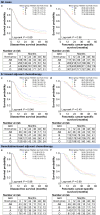Blood Group Antigen Expression in Blood and Tumor in Relation to Survival Outcomes in Resected Pancreatic Cancer, Overall and by Adjuvant Chemotherapy Regimens
- PMID: 40314902
- PMCID: PMC12317920
- DOI: 10.1245/s10434-025-17289-7
Blood Group Antigen Expression in Blood and Tumor in Relation to Survival Outcomes in Resected Pancreatic Cancer, Overall and by Adjuvant Chemotherapy Regimens
Abstract
Background: Few comprehensive studies have examined the associations of the ABO blood group with survival outcomes for patients with resected pancreatic cancer, overall and by adjuvant chemotherapy regimens.
Methods: This multicenter study enrolled 1153 patients with resected pancreatic cancer. The hazard ratios (HRs) for disease-free and pancreatic cancer-specific survival were calculated with adjustment for potential confounders, including KRAS mutation and CDKN2A (p16), TP53, and SMAD4 expression, using the Cox proportional hazards regression model. Blood group antigen expression in tumors was immunohistochemically assessed.
Results: The ABO blood group was not associated with disease-free or pancreatic cancer-specific survival (P > 0.90). For pancreatic cancer-specific survival, blood groups A, B, and AB had multivariable HRs of 0.97 (95% confidence interval [CI], 0.81-1.15), 1.03 (95% CI, 0.83-1.26), and 0.99 (95% CI, 0.76-1.30), respectively (vs. O). The associations between ABO blood group and disease-free and pancreatic cancer-specific survival differed according to the adjuvant chemotherapy regimens (Pinteraction = 0.011 and 0.008, respectively). For the patients without chemotherapy, the HRs for disease-free survival were 0.99 (95% CI, 0.69-1.41) for blood group A, 1.65 (95% CI, 1.09-2.48) for blood group B, and 1.79 (95% CI, 1.01-3.17) for blood group AB, (vs. O). For the patients receiving S-1-based chemotherapy, blood group AB (vs. O) exhibited a reverse association (HR, 0.63; 95% CI, 0.39-1.00). Similar interactions were observed when blood group antigen expression in tumors was analyzed.
Conclusions: The ABO blood group is not a prognostic biomarker in resected pancreatic cancer overall but may predict the effectiveness of adjuvant chemotherapy.
Keywords: Blood group antigens; Cohort studies; Mortality; Pancreatectomy; Pancreatic ductal adenocarcinoma.
© 2025. The Author(s).
Conflict of interest statement
Disclosure: Drs. Masugi and Hamada acknowledge research funding from the Daiichi Sankyo TaNeDS Funding Program. Dr. Sasahira acknowledges scholarship donation to institution and honararia for speakers from Taiho Pharmaceutical. Dr. Takeuchi acknowledges consultancy fees from Nichirei Bioscience, Nippon Shinyaku, and Meiji Seika Pharma; research support from Fujirebio, SONY, and Daiichi Sankyo; honoraria from Eli Lilly, Chugai, Kyowa Kirin, and Janssen; and royalties from Sysmex, AMOY, and Nichirei bioscience. This work was not funded by any of those companies. No other conflicts of interest exist. The remaining authors declare no conflicts of interest.
Figures




References
-
- Siegel RL, Giaquinto AN, Jemal A. Cancer statistics, 2024. CA Cancer J Clin. 2024;74:12–49. - PubMed
-
- Inoue Y, Saiura A, Oba A, et al. Neoadjuvant gemcitabine and nab-paclitaxel for borderline resectable pancreatic cancers: intention-to-treat analysis compared with upfront surgery. J Hepatobiliary Pancreat Sci. 2021;28:143–55. - PubMed
-
- Uesaka K, Boku N, Fukutomi A, et al. Adjuvant chemotherapy of S-1 versus gemcitabine for resected pancreatic cancer: a phase 3, open-label, randomised, non-inferiority trial (JASPAC 01). Lancet London England. 2016;388:248–57. - PubMed
-
- Truty MJ, Kendrick ML, Nagorney DM, et al. Factors predicting response, perioperative outcomes, and survival following total neoadjuvant therapy for borderline/locally advanced pancreatic cancer. Ann Surg. 2021;273:341–9. - PubMed
-
- Boone BA, Steve J, Zenati MS, et al. Serum CA 19–9 response to neoadjuvant therapy is associated with outcome in pancreatic adenocarcinoma. Ann Surg Oncol. 2014;21:4351–8. - PubMed
Publication types
MeSH terms
Substances
Grants and funding
- JP20K07414/Japan Society for the Promotion of Science
- JP21K15368/Japan Society for the Promotion of Science
- JP21K15393/Japan Society for the Promotion of Science
- JP22H02841/Japan Society for the Promotion of Science
- JP23K15485/Japan Society for the Promotion of Science
- Not available/Pancreas Research Foundation of Japan
- Not available/Daiwa Securities Health Foundation
- Not available/Takeda Science Foundation
- Not available/Okinaka Memorial Institute for Medical Research
- Not available/Vehicle Racing Commemorative Foundation
- JP21ck0106557/Japan Agency for Medical Research and Development
LinkOut - more resources
Full Text Sources
Medical
Research Materials
Miscellaneous

